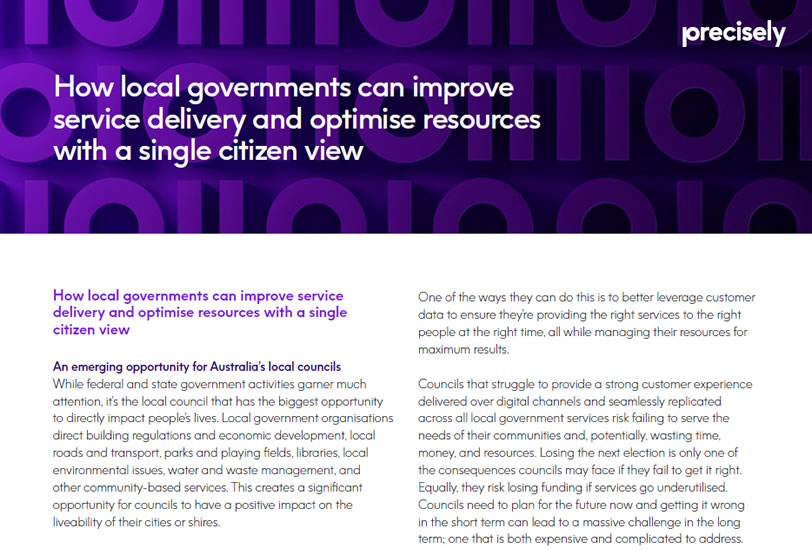White Paper
How Local Governments Can Improve Service Delivery and Optimize Resources with a Single Citizen View
Progressive local governments can improve a council’s re-election chances and increase the quality of life for members of their community.
An emerging opportunity for Australia’s local councils. While federal and state government activities garner much attention, it’s the local council that has the biggest opportunity to directly impact people’s lives. Local governments direct building regulations and economic development, local roads and transport, parks and playing fields, libraries, local environmental issues, water and waste management, and other community-based services. This creates a significant opportunity for councils to have a positive impact on the liveability of their cities or shires.
For example, when members of the community need to engage with the council, they can often find themselves spending lengthy periods of time until they find someone who can help. During this engagement, they often speak with multiple departments and provide repetitive information. This is common and a key cause of declining citizen satisfaction.
As technology has become all-pervasive in corporate and consumer life, councils are faced with a mandate to digitally transform. Members of the community expect councils to interact with them in much the same way businesses would, with an individualized approach based on curated insights gathered about the person. Running councils like businesses, therefore, is an essential next step in the evolution of local government.
Becoming a leading example of progressive local government can significantly improve a council’s re-election chances and dramatically increase the quality of life for members of their community. Australian councils are already vying to be at the top of the pile by using innovative technology to make their cities smarter and run more effectively.
Becoming a leading example of progressive local government can significantly improve a council’s re-election chances and dramatically increase the quality of life for members of their community. Australian councils are already vying to be at the top of the pile by using innovative technology to make their cities smarter and run more effectively.
When local governments fail to manage citizen data effectively, they can suffer six key issues:
- It becomes harder to identify which members of the community need what services and when, leading to a degradation in service delivery.
- People can be required to constantly provide the same information to different council service providers, leading to frustration and a sense that the council doesn’t understand or care about them as individuals.
- The time and money invested on initiatives and programs can be wasted because they don’t get to the right people in the right ways. For example, erroneous data can mean a council sends critical information to the wrong addresses, so they bear the cost of returned mail as well as the lost opportunity to engage with that person about an important matter.
- The council may struggle to maintain an effective digital presence with backend systems that aren’t integrated, interfering with their ability to deliver a personalized experience.
- Mistakes can creep in, leading to customers feeling disaffected, revenue taking a hit, and services being underused.
- Effective digital transformation may be hampered by a lack of useful data.
Read this white paper and learn more about how progressive local governments can improve a council’s re-election chances and increase the quality of life for members of their community.
